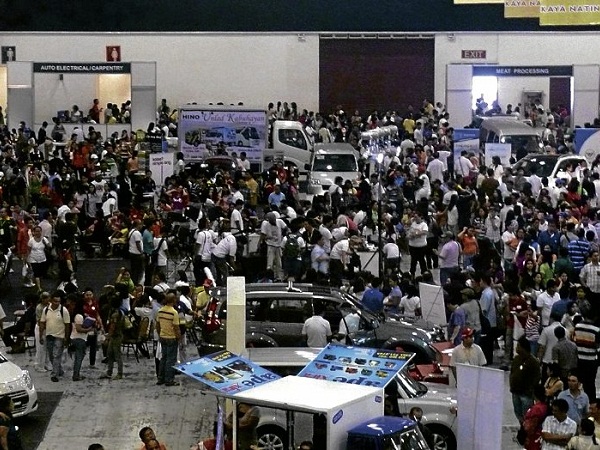Spirit of goodwill makes traders ‘pay it forward’

MULTIPLIER EFFECT The three-day Unlad Kabuhayan summit didn’t just offer goods and services but a glimpse into the vendors’ trade secrets so others can replicate their success.
Precy Nilda Duque, 32, found work in Qatar in December 2006 but later felt the sad difficulty of being away from her ailing father and four dependent siblings. Compounding her worries was her failure to fulfill her religious obligations in a foreign land.
And so the sole breadwinner prayed for another source of livelihood, one that would no longer force her to leave her family. Six years later, the balikbayan can now make her own line of laundry detergent and dishwashing soap and is even willing to share her knowhow with others.
Kristine Marie Navarro, 30, struggled for more than 10 years as a contractual factory worker while selling merchandise from T-shirts to shampoos on the side. Today, however, she proudly sells perfumes which she herself concocts from different scents imported from France.
Like Duque, Navarro wants to share what they know to others; she even gives a free instructional video for every customer who buys her perfume.
Precy and Christine are just two of the 1,075 scholars of Unlad Kabuhayan, a free livelihood program that encourages people to “pay it forward,” by teaching others the entrepreneurship skills they had been taught.
Article continues after this advertisementThe top 200 of those entrepreneurship graduates were among the 400 exhibitors at the three-day Unlad Kabuhayan Summit 2012 held from Aug. 26 to 28 at World Trade Center Manila, Pasay City, in partnership with Eagle Broadcasting Corp. and NET 25
Article continues after this advertisementThe Unlad Kabuhayan graduates not only sold their own products but also gave free lessons to those who were interested in their trade secrets—all in the spirit of livelihood empowerment.
Organizers said the seminars held during the summit drew almost 10,000 participants, five times the number they expected. Among the key supporters in attendance were Technological Education and Skills Development Authority (Tesda) chair Joel Villanueva and trade department officials.
The seminars, collectively dubbed “May K sa Pag-Unlad,” focused mostly on businesses which could be jumpstarted with a seed capital of only P300 to P3,000.
‘Balikbayan’ success stories
They offered Tesda-accredited courses in making perfumes or fragrances, soaps and detergents, candies and chocolates, as well as in hog-raising, integrated farming and basic wedding photography.
There were also seminars in bookkeeping and accounting, selling strategies, customer service, strategic crisis management, social network or online marketing, and web design for businesses.
A convention titled “Kaya Kong Umunlad sa Sarili Kong Bayan (I Can Make it Big in My Own Country),” showcased the success stories of former migrant workers who mustered the courage to return to the country and start their own business.
Unlad Kabuhayan gives flesh to the proverb about “teaching a man how to fish” so they could be financially independent, according Gigi Lapira, officer in charge of the Unlad Kabuhayan (program. It was launched with the help of up to 50 entrepreneurship mentors in April and gained ground with the summit where thousands more were taught livelihood skills.
“Those who enter the program are encouraged to share what they learned in due time,” said Lapira, herself a successful entrepreneur running her own architecture firm.
Giving back the good received
According to the program literature, “this pay-it-forward system (giving back the good that you have received) will allow more people to rise from poverty, rise above economic stagnation and achieve greater success.”
“The cycle of sustainability will be supported by the mentorship concept,” it said. “All individuals who enter the program and eventually succeed should go back to the program as a mentor and help more individuals who in turn will repeat the process.”
Sofia Ravarra, a chemist and one of the UK mentors, said she joined the summit because of this advocacy. After helping in the development of various products for big companies, Ravarra taught UK scholars how to make soaps, detergents, fabric conditioners and dishwashing liquid.
Another mentor, Rodal Penullar, taught perfume making to some 3,000 people who registered in his class during the three-day summit.
The affair also saw the launch of “Buskwela,” (a play on bus and eskwela or school) a mobile version of the UK program which will bring the different livelihood courses to depressed areas.
“We want to help more people, especially those who hardly have money for transportation to attend livelihood seminars. So the Buskwela will go to them,” Lapira said.